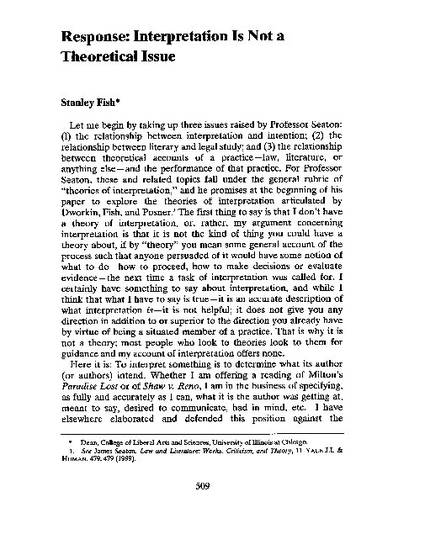
Let me begin by taking up three issues raised by Professor Seaton: (1) the relationship between interpretation and intention; (2) the relationship between literary and legal study; and (3) the relationship between theoretical accounts of a practice-law, literature, or anything else-and the performance of that practice. For Professor Seaton, these and related topics fall under the general rubric of "theories of interpretation," and he promises at the beginning of his paper to explore the theories of interpretation articulated by Dworkin, Fish, and Posner. The first thing to say is that I don't have a theory of interpretation, or, rather, my argument concerning interpretation is that it is not the kind of thing you could have a theory about, if by "theory" you mean some general account of the process such that anyone persuaded of it would have some notion of what to do - how to proceed, how to make decisions or evaluate evidence-the next time a task of interpretation was called for. I certainly have something to say about interpretation, and while I think that what I have to say is true - it is an accurate description of what interpretation is - it is not helpful; it does not give you any direction in addition to or superior to the direction you already have by virtue of being a situated member of a practice. That is why it is not a theory; most people who look to theories look to them for guidance and my account of interpretation offers none.
Here it is: To interpret something is to determine what its author (or authors) intend. Whether I am offering a reading of Milton's Paradise Lost or of Shaw v. Reno, I am in the business of specifying, as fully and accurately as I can, what it is the author was getting at, meant to say, desired to communicate, had in mind, etc. I have elsewhere elaborated and defended this position against the objections one might put to it, and there is insufficient space here to rehearse my arguments, but a few points probably should be made. First, the thesis that interpretation is the attempt to determine intention in no way privileges the author as an interpreter. The husband who says to his wife, "Where is the book I have been reading?" may at the moment of utterance believe that he intends only to ask a question or to ask for help, but his wife may hear him as speaking out of hostility and making an accusation ("You've put my book somewhere"). In the "discussion" that might follow, he may become convinced that she is right, in which case he would revise his understanding of what his intention was. Or, alternatively and more likely, he might dig in his heels and complain that he was being misunderstood. Notice that the complaint could not be that his words, in and of themselves, were being misunderstood. "Where is the book I have been reading?" presents no interpretive difficulties or ambiguities of that kind. Rather, the husband's complaint would be that his intention - the spirit or purpose of his utterance, the nature of the speech act being performed - was being misunderstood.
Available at: http://works.bepress.com/stanley-fish/21/
